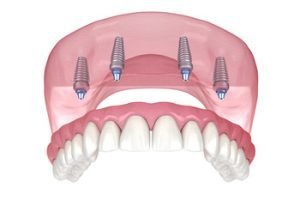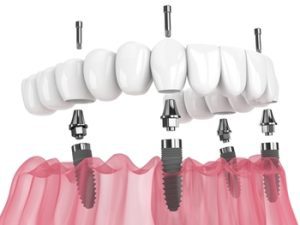Much like general health, dental health evolves with time, technology, and research. Today, the dental industry offers myriad solutions for those seeking to restore their smile and confidence. One of Australia’s most sought-after dental treatments is the installation of dental implants. But why are full-mouth implants becoming such a rage, and how does the cost factor in? Let’s delve deep into this modern dental marvel.
Diving Deeper into Dental Implants
Dental implants have revolutionised the world of restorative dentistry. At their fundamental level, these are titanium posts, chosen for the metal’s biocompatibility with the human body. Dentists meticulously insert these into the jaw bone, serving as the new roots for missing teeth.
Over time, the jawbone integrates with this titanium post, leading to a robust and stable foundation. This foundation is what the replacement teeth or crowns will be mounted on, ensuring they stay in place just like natural teeth.
Navigating the Evolution of Dental Implants
The inception and evolution of dental implants have revolutionised how we address tooth loss. While our current understanding hinges upon titanium posts and jawbone integration, the journey of dental implants is rooted in history and marked by fascinating milestones.
Historical Traces
Ancient civilisations demonstrated remarkable ingenuity in addressing tooth loss. Archaeological findings from ancient Egypt, for example, have revealed gold wire used to stabilise loose teeth. Meanwhile, ancient Mayans used pieces of seashells as primitive implants, showcasing human resourcefulness even in prehistoric times.
Fast-forward to the 20th century, and the evolution was propelled by serendipitous discovery. In the 1950s, Dr Per-Ingvar Brånemark, a Swedish scientist, observed the integration of titanium with bone, paving the way for the modern implantology era.
Understanding Dental Implant Types
While we’ve discussed full-mouth dental implants extensively, it’s crucial to understand the spectrum of implant options:
- Endosteal Implants:
These are the most common type, resembling screws or small posts, and are placed directly into the jawbone.
- Subperiosteal Implants: Positioned under the gum but on or above the jawbone, these are ideal for patients with shallow jawbones or those who don’t wish to undergo bone augmentation procedures.
- Zygomatic Implants: The least common type, these are placed in the cheekbone rather than the jawbone. It’s an option for those with inadequate jawbone density and who don’t want to opt for bone grafting.
Demystifying the Materials
While titanium stands tall as the flagship material for dental implants due to its biocompatibility, research and innovation have introduced alternatives; Zirconium, for instance, offers aesthetic advantages given its tooth-coloured hue. Each material comes with its own set of pros and cons, and the choice often hinges on individual patient needs, allergies, or preferences.
The Allure of Full Mouth Implants
Opting for full-mouth implants is often the golden standard for individuals who have lost most or all of their teeth due to conditions like advanced periodontal disease, extensive tooth decay, or unfortunate accidents.
Their comprehensive nature sets full mouth implants apart — they replace an entire arch (upper, lower, or both) of teeth. This is a transformative leap from conventional dentures, giving recipients a second chance at a fully functional, radiant smile that doesn’t shift or come off.
Eligibility Criteria for Full Mouth Dental Implants
General Health
First and foremost, candidates must be in good general health. While dental implants have a high success rate, the body’s ability to heal post-surgery is a crucial factor. Those with chronic conditions, such as diabetes or heart disease, might still be candidates. Still, they must manage their conditions effectively and consult closely with their medical doctor and dentist.
Oral Health
For dental implants to succeed, the mouth must be reasonably healthy. Conditions like untreated tooth decay or active periodontal (gum) disease can jeopardise the success of the implant. Before considering implants, such issues should be addressed.
Jawbone Density
The jawbone plays a pivotal role in securing the implant. Candidates with a compromised or thin jawbone might require bone grafting procedures before implant placement. This ensures that the jawbone can adequately support and fuse with the implant.
Lifestyle Factors
Smoking or excessive alcohol consumption can impede the healing process post-implant surgery and increase the risk of complications or implant failure. Candidates are usually advised to quit smoking before undergoing the procedure and maintain this cessation post-op for optimum healing.
Commitment to Oral Hygiene
While dental implants are resistant to cavities, the surrounding gum tissue isn’t immune to gum disease. A candidate must be committed to maintaining rigorous oral hygiene practices, including regular brushing, flossing, and dental check-ups.
Realistic Expectations
Patients must have realistic expectations about the process, recovery time, and outcomes. An experienced dentist will provide a clear picture of what to expect, but understanding that it’s a commitment, not a quick fix, is vital.
Financial Preparedness
While not a health criterion, it’s worth noting that full-mouth dental implants are an investment. Candidates should be prepared for the financial aspect, though many clinics now offer flexible payment plans to help manage the cost.
No Age Limit, But…
There’s a common myth that older people might not be suitable candidates for dental implants. In truth, age isn’t a strict barrier. However, younger patients, particularly those still growing, might need to wait until their facial structure fully develops.
Unravelling the Dental Implant Procedure
Initial Consultation

Charting the Treatment Plan
Every mouth is unique, and so is its treatment plan. By leveraging the latest in dental diagnostics and technology, a custom roadmap is crafted for the patient. This could also involve discussions around sedation dentistry, ensuring even the most anxious individuals undergo the procedure in a state of complete relaxation.
Bone Grafting (when necessary)
A strong jawbone is paramount for the success of dental implants. For those with diminished bone density, a bone graft becomes essential. This procedure augments the jawbone, ensuring it can securely host the implant.
The Crucial Implant Surgery
The dentist inserts the titanium posts into the jaw bone in a meticulously planned procedure. The number of implants varies, from singular ones replacing individual teeth to four or more, providing a base for a full arch of teeth.
Healing and Final Touches
Following the surgery, patience is key. The jawbone undergoes osseointegration, fusing with the implants, which can span several months. This is pivotal for the longevity and stability of the implant. Once fully healed, the stage is set for the final restoration. This involves affixing the dental crowns or bridges, often sculpted from premium materials like zirconia, ensuring they mirror the aesthetics of real teeth.
Deciphering the Benefits of Full Mouth Dental Implants
- Mimicking Nature: Full mouth implants come closest to replicating the function and feel of real teeth. Whether biting into an apple or delivering a speech, they’re as reliable as the real deal.
- A Boon for Oral Health: Dental implants work in harmony with your existing natural teeth. Unlike bridges that need support from adjacent teeth, implants stand independently, ensuring no harm to neighbouring teeth. Moreover, by stimulating the jaw bone, they thwart potential bone degradation.
- An Investment in Longevity: Treat them right with consistent oral hygiene, and dental implants could be your lifelong companions. Their durability and resistance to decay make them a valuable investment for the future.
- Unparalleled Comfort: Gone are the days of dentures slipping or causing sore spots. Full mouth implants are the epitome of comfort, seamlessly integrating with your oral environment.
Full Mouth Dental Implants Cost, Australia: Considerations
Undoubtedly, the question of dental implant cost will surface in your research. The price for a full-mouth dental implant can differ depending on factors like the quality of your jaw bone, your location within Australia, the number of implants needed, and the choice between traditional implants or implant-retained dentures.
However, looking merely at the upfront cost can be misleading. It’s essential to consider these implants’ longevity and quality of life. While a single implant might seem more affordable, the cumulative benefits of full-mouth implants, especially when considering the potential for replacing multiple teeth, often justify the investment.
Moreover, dental treatments, especially high-cost dental procedures, sometimes enjoy coverage under private health insurance companies. It’s always a good idea to check with your provider about coverage for major dental treatments.
Factors That Influence the Dental Implant Cost
- Choice of Materials: The final cost can be swayed by the materials used. Opting for high-end materials like zirconia for the final prosthesis can influence the overall pricing.
- The Intricacies Involved: Dental restorations are as much an art as they are a science. Complex cases demanding additional interventions like sinus lifts can affect the overall cost.
- Expertise Comes at a Price: The hands that craft your new smile matter. A seasoned implantologist with a track record of successful implant placements might have a premium pricing structure. However, their expertise often translates to superior outcomes.
- Location: As with most services, metropolitan areas might command higher prices compared to more regional settings in Australia. It’s always wise to factor in the location of your chosen dental clinic.
Post-Implant Care and Maintenance
Implants are a marvel of restorative dentistry but require dedicated care:
- Routine Check-ups: Regular visits to the dentist ensure that your implants remain in top shape and that any budding issues are promptly addressed.
- Impeccable Oral Hygiene: Just because they aren’t “real” teeth doesn’t mean they can’t accumulate plaque. Regular brushing, flossing, and investing in a water flosser can go a long way.
- Protection: If you’re into contact sports or have a habit of grinding your teeth, consider wearing a mouthguard to protect those precious implants.
Debunking Common Myths
- Implants are Noticeably Fake: Modern dental implants, especially when executed by experienced dentists, blend seamlessly with natural teeth, ensuring they’re virtually undetectable.
- The Process is Excruciating: With advancements in sedation dentistry and pain management, the implant procedure is now more comfortable than ever. Many patients report that there is minimal discomfort, similar to that of simple tooth extraction.
The Emotional and Psychological Benefits of Full Mouth Dental Implants
The discourse around full-mouth dental implants often centres on the physical and functional benefits, but the emotional and psychological uplift they provide is equally noteworthy.
For many individuals, missing teeth or relying on traditional dentures can bring a significant amount of emotional distress. Feelings of self-consciousness, embarrassment, or even shame can become everyday experiences. These emotions can hinder social interactions and even impact personal and professional relationships.

Moreover, the confidence of being able to smile, laugh, and converse without any inhibitions or fears of judgment is empowering. The aesthetic appearance of high-quality materials like zirconia bridges provides a natural look, further adding to the sense of self-assurance.
In essence, while the physical merits of dental implants are undoubtedly profound, the psychological boost they offer is just as valuable, helping individuals to rediscover and reclaim their confidence and joy in social settings.
In Conclusion: Is the Investment Worth It?
When you’re deliberating on the pros and cons of mouth dental implant procedure versus other tooth replacement options, remember to factor in the long-term benefits. The advantages are manifold, from renewed confidence to the joy of biting into your favourite foods without worry. And when viewed as a lifetime investment in oral health, comfort, and self-esteem, the costs seem justifiable and wise.
Ready to Rediscover Your Smile?
At Carindale Family Dentist, we believe everyone deserves a chance to smile confidently. Our team of quality dentists is committed to providing tailor-made solutions for your unique dental health needs. Call us at (07) 3324 9172 and book a consultation today!Embark on your journey to a radiant, natural-looking smile.
Note: Any surgical or invasive procedure carries risks. Before proceeding, you should seek a second opinion from an appropriately qualified health practitioner.
References:
https://www.ncbi.nlm.nih.gov/pmc/articles/PMC5455450/
https://www.ncbi.nlm.nih.gov/pmc/articles/PMC3493630/
http://pmiaustraliaconference.org.au/the-complete-guide-to-dental-implants-cost-in-australia/




 These are the most common type, resembling screws or small posts, and are placed directly into the jawbone.
These are the most common type, resembling screws or small posts, and are placed directly into the jawbone.